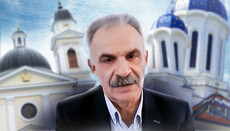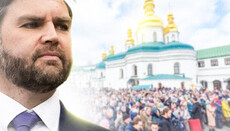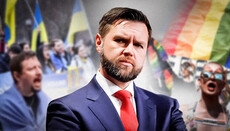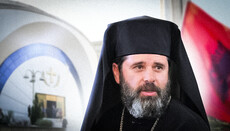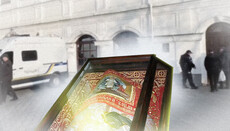What is the Bishop of Comana right and wrong about?
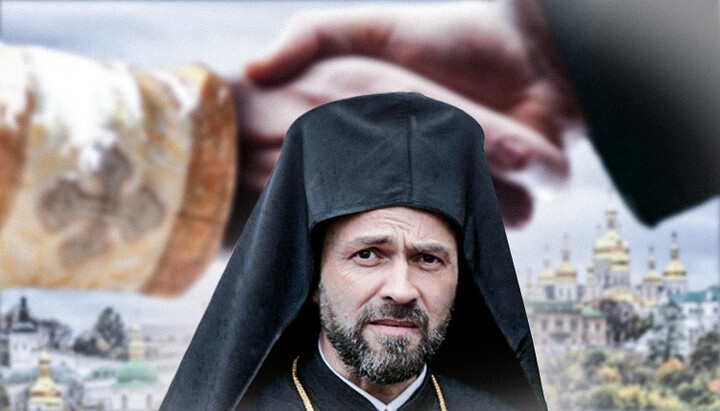
Is unity of the UOC and OCU possible? We sort out and examine the recipe from the Phanar Exarch for Ukraine, Bishop Michael (Anishchenko).
It’s no news to anyone that there is no unity in Ukrainian Orthodoxy. At the same time, there are two diametrically opposed views on how to achieve it. The first implies that the only Church of Christ in Ukraine is the UOC, and in order to achieve unity, the rest of the structures must return to its fold. Supporters of the other view believe that there are two equivalent canonical denominations in the country (UOC and OCU) and they just need to unite. However, they are sure that the UOC as “Moscow” and “collaborator” is not worthy to unite on an equal footing, but should join the ranks of the OCU as the only “legitimate” and “autocephalous” church.
Recently, the views of the second group have been particularly actively promoted in Ukraine. Its authors propose to “discard” all differences and unite “for the sake of Ukraine”. Under such theses, a “dialogue meeting” was held in St. Sofia Cathedral not so long ago, organized by the State Service for Ethnopolitics. In the same vein, the Exarch of the Phanar, Bishop Michael (Anishchenko) of Comana gave several interviews. We propose to analyze the main arguments of the hierarch of the Patriarchate of Constantinople from his interview with the DialogTut resource.
On the Eucharist and the Breaking of Communion
As you know, after the Phanar’s invasion of Ukraine in 2018, the UOC and ROC broke off communion with the Patriarchate of Constantinople, as well as with the Churches that recognized the OCU – the Greek, Alexandrian and Cypriot. And this is not the only precedent in the history of Orthodoxy.
The DialogTut correspondent complains that now there is no Eucharistic communion between the Churches of Antioch and Jerusalem, the Patriarchates of Moscow and Constantinople. And he asks the Exarch Phanar a naive but correct question: “Is it possible so?”
The Bishop of Comana says that the gap between the Churches of Antioch and Jerusalem and the Patriarchates of Moscow and Constantinople are two different things.
“The termination of commemoration between primates does not contain a prohibition for clergy and laity of both Local Churches to concelebrate, pray and participate in the sacraments together. There is Eucharistic communion, no one interrupted it, but there is no personal commemoration,” says Bishop Michael. As for the break in communion between the Russian Orthodox Church and the Phanar, the exarch said that here there is a ban not only on the commemoration of the primate, but also on joint service, participation in prayers and sacraments. By the way, since the UOC, at its Council on May 27, 22, declared complete independence from the ROC, it is correct to speak separately about the severed communion between the ROC and the Phanar and separately about the break between the UOC and the Phanar.
In order to solve this problem, at least at the level of the laity, Bishop Michael proposes to simply ignore the position of the hierarchy and the decisions of the Holy Synod and the Council of Bishops. He says, “After all, an Orthodox Christian <…> is not a slave or a serf tied to some particular church jurisdiction. When he moves to the canonical territory of another metropolis or Local Church, he automatically becomes a child of the local hierarch and the local church community, so that, by the fact of his baptism, he can freely participate in the sacraments and church life."
Yes, it may be more convenient, but there is a hidden call to the children of the UOC (in particular) to disobey their hierarchy in these words of Bishop Michael. According to him, what difference does it make that we recognized the “consecrations” of persons excommunicated from the Church? What difference does it make that we change the doctrine of the Church and preach the primacy of the Patriarch of Constantinople? What difference does it make that we rush headlong towards unification with the Catholics? All this is minor – just come to us and participate in church life. This is the message of the Exarch of Constantinople.
On the causes of church division in Ukraine
The correspondent asks why representatives of various Ukrainian confessions, “residents of the same country, cannot agree and reconcile among themselves?” What is the main reason for the division?
The main reason for the division, according to Bishop Michael, is that the UOC does not want to come to terms with the new “reality” created by the Phanar.
“We must accept the reality: there is a local Orthodox Church in Ukraine,” says the Phanar exarch. Accordingly, accession to this reality, i.e. to the OCU, will solve all problems. The fact that 2/3 of the Local Orthodox Churches do not recognize the OCU, as well as the reality of the “consecrations” of its “hierarchs”, does not bother Bishop Michael. He believes that Phanar will be able to push through its "reality" no matter what.
Bishop Michael also considers that the reason for the division is “the absence of an official church condemnation of the conscious collaboration of individual representatives of the clergy who supported or collaborated with the aggressor; support for the actions of the administrative center in the matter of breaking the Eucharistic communion; jurisdictional dependency." All this, of course, is about the UOC.
First, collaboration (even if such cases have taken place) has nothing to do with ecclesiology. The Church is not obliged to “officially respond” to it. It is no secret that the ill-wishers of the UOC are ready to sign up all its priests as collaborators and especially those who did not abandon their flock, but stayed with them in the temporarily occupied territories. However, we cannot blame them. These people, for the most part, are fulfilling their priestly duty.
If someone really passed the coordinates of the military to the enemy or otherwise helped the occupier, this is a criminal case, and he must answer according to the law. However, the entire Church cannot be held responsible for this.
Secondly, the Moscow Patriarchate is not an “administrative center” for the UOC, and when the Holy Synod of the UOC decided to break off Eucharistic communion with the Patriarchate of Constantinople, it did not at all support the ROC in this matter, but acted independently. After all, the intervention of the Phanar caused harm primarily to the UOC, and it is the UOC that is affected today, not the Moscow Patriarchate.
Thirdly, the UOC does not depend "jurisdictionally" on the ROC. After the decisions of the Council of the UOC on May 27, 22, it cannot be questioned at all.
When silence is not golden
Still, the Bishop of Comana prefers to keep silent about all this. As he prefers to remain silent about other factors that objectively interfere with the dialogue between the UOC and the OCU. These are mass raids of UOC churches, this is violence against clergy and believers, this is defamation of the UOC in the media, this is state pressure, etc.
However, a Christian cannot support repression against his brothers, especially if he wants to unite with them. Appeals followed to the exarch with a request to support the UOC, including from the clergy of his own denomination. Thus, in December 2022, the priest of the Patriarchate of Constantinople in Spain, Fr. Tarasiy Petruniak appealed to the Bishop of Comana to raise his voice against the arbitrariness of the authorities in relation to the UOC.
“One can notice how the ‘brothers’ in Christ – Greek Catholics silently pass by the UOC, unwilling to help, while their supreme archbishop does not want to raise his voice against injustice as if he turns a blind eye to this. The same concerns the 'clergy' of the OCU and their 'metropolitan', who turns his face away from lawlessness and then falsely preaches about love for one’s neighbor. Don't you think that we, the clerics of the first honored Church, should act not so hypocritically? We must raise our voice in defense of our brothers in faith and blood!” wrote in an open letter Fr. Tarasy. Yet, the Phanar Exarch was silent. Anyway, what dialogue can there be if one party silently watches the repressions and destruction of their counterparts? I wish it were only silently.
For several years now, the “Spiritual Front” resource has been operating in Ukraine, the founder of which, Alexander Efremenko, serves as a subdeacon for the exarch. Judging by the publications, the main task of the resource is to incite hatred against the UOC. This is done through manipulation, twisting information, and often outright lies. It is very difficult to imagine that this is published without the knowledge or even the blessing of Bishop Michael. Do all these falsehood and slur contribute to dialogue? No, they only add to the defeat of the "competitor".
There is another obstacle to dialogue, which perhaps the most significant. This is the fact that "bishops" of the OCU have no canonical ordinations. The Phanar and the OCU are trying to “turn a blind eye” to this problem, but it has not vanished into the thin air, and something needs to be done about it.
The Exarch says, “In order to implement unity, in my opinion, it is necessary to overcome mutual grievances of thirty years. The benefit of the Church and the people of God must be put first, even if it harms the personal interests of individuals.”
The words are definitely correct. But what does Bishop Michael actually offer us? What should be the benefit? Should the canonical priesthood and the faithful merge with people in vestments, whom most of the Local Churches consider to be laymen? Who, by deceit and force, seize other people's property, “bless” violence against their own fellow citizens? Does this have anything to do with what Christ teaches? Could this be of any use today? And what will it be like tomorrow?
Recall that the OCU is in “jurisdictional dependence” on the Phanar. The text of the Tomos leaves no room for doubt about this. Here are just a few points:
- The OCU recognizes the Patriarch of Constantinople as its head;
- The OCU gives its parishes abroad to the jurisdiction of the Phanar;
- The OCU recognizes the Patriarch of Constantinople as the supreme judge;
- The OCU is obliged to coordinate all important issues with the Phanar: “To resolve important issues <…> one should <…> turn to our Most Holy Patriarchal and Ecumenical Throne.”
What does all this mean? Only one thing:
if the UOC unites with the OCU, it will have to recognize the power of the Patriarchate of Constantinople over itself in all these manifestations.
Will it be confined only to the above?
After all, it is hard not to notice the ecumenical tendencies of the Phanar's rapprochement with the Catholics, dozens of statements about the upcoming unity. Let us recall the words of the head of the Phanar Archdiocese in the USA, Elpidophoros, that all religions are myriads of paths leading to one God.
Furthermore, is it only about ecumenism? The same Archbishop Elpidophoros in 2022 performed the baptism of the children of a couple of sodomites. Moreover, we did not see any signs of condemnation of this action from the Patriarchate of Constantinople. On the contrary, the leading theologian of the Phanar, John Chrysavgis, supported the actions of the bishop. In turn, commenting on the issue of attitudes towards LGBT people, the OCU leader Epifaniy Dumenko said that “now we need to work on this so that the Ukrainian society could assimilate it.”
All these are not abstract questions, as it may seem. It is the future of the spiritual life of the "little Ukrainian", a rank-and-file believer.
In our opinion, everyone who thinks about how good it would be to unite with the OCU should ask themselves a few questions: why do I need this? What do I lack for my salvation today? Do I agree to eventually end up in another union? Do I agree with the prospect of accepting “European values”, or is the Orthodox faith still dearer to me?
What to do?
Asked by the correspondent “What steps need to be taken to break the ice?”, Bishop Michael replies, “You just need to take steps and come forward. <…> No need to complicate things. Everything is elementary. The main thing is to have a desire and start acting, not just make declarations. If there is no desire for unity, then you can continue to engage in demagogy, blame each other, prove to society who is better: it will be high-profile, spectacular, but useless for the Church.”
If we summarize everything, then the recipe for unity from the Exarch of the Phanar is as follows: I have many complaints against the UOC, but none against the OCU. They justifiably hate the UOC in the media and social networks, justifiably seize its temples and property by deceit and force, take away the Lavra and do their best to destroy it. The UOC needs to forget about all this and come forward to bow to Epifaniy Dumenko (and therefore to Patriarch Bartholomew). This will be beneficial to the Church and the people.
Let's venture to offer our ways for unity.
Everyone knows the proverb "Love cannot be forced". No one has ever united "at gunpoint". Even if they did, it would be for a very short time. Moreover, this is absolutely impossible in the Church of Christ, where everything should be ruled by love, rather than by force.
The Orthodox people of Ukraine are divided today. In order to overcome any division, to extinguish quarrels, one must not grab by the throat, but meet half way. If the OCU (and the Phanar) really want true, not hypocritical, unity of Ukrainians, they must come forward and do the following:
- stop the tack of seizing churches of the UOC and return to the affected communities their property;
- call on the state to return the sanctuaries of the Upper Lavra of the UOC and renounce claims to the Pochaiv Lavra;
- call on their believers and "patriotic" media to stop persecution of the UOC;
- create a commission with the hierarchy of the UOC to solve the problem of consecrations of the “episcopate” of the OCU. This can be done with the help of any of the Local Churches. It may be necessary to convene a Council of Primates of the Churches for this end.
Now the OCU members are certain to roll their eyes in response in a manner like they have almost “squeezed” the UOC together with the authorities, so why should they need it? Still, if they really want true benefit for the Church and the people, there is no other recipe and cannot be.
